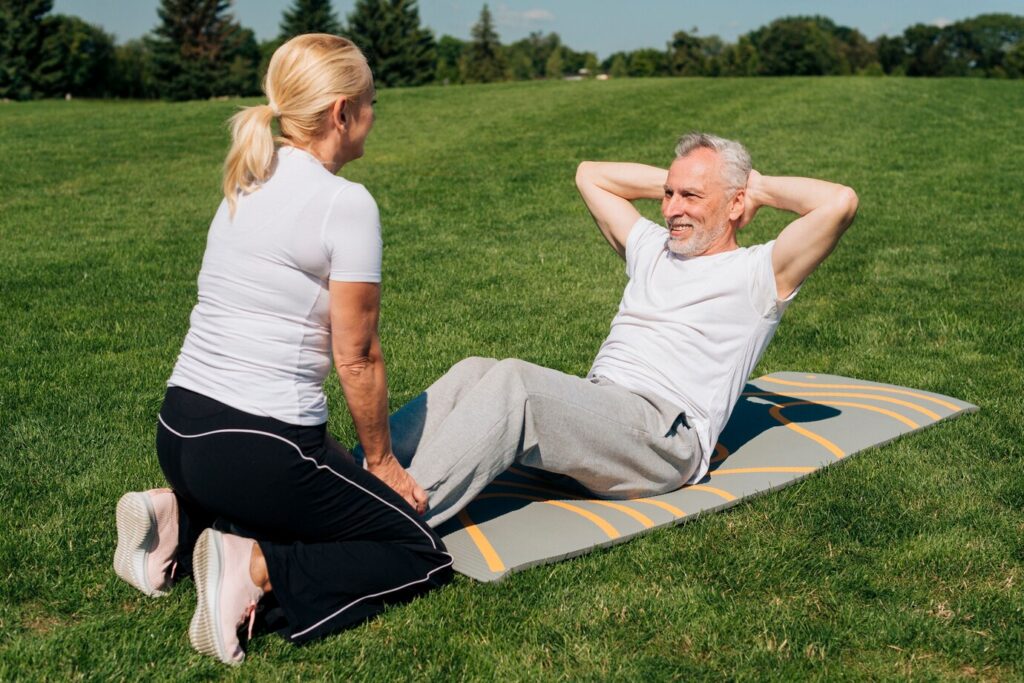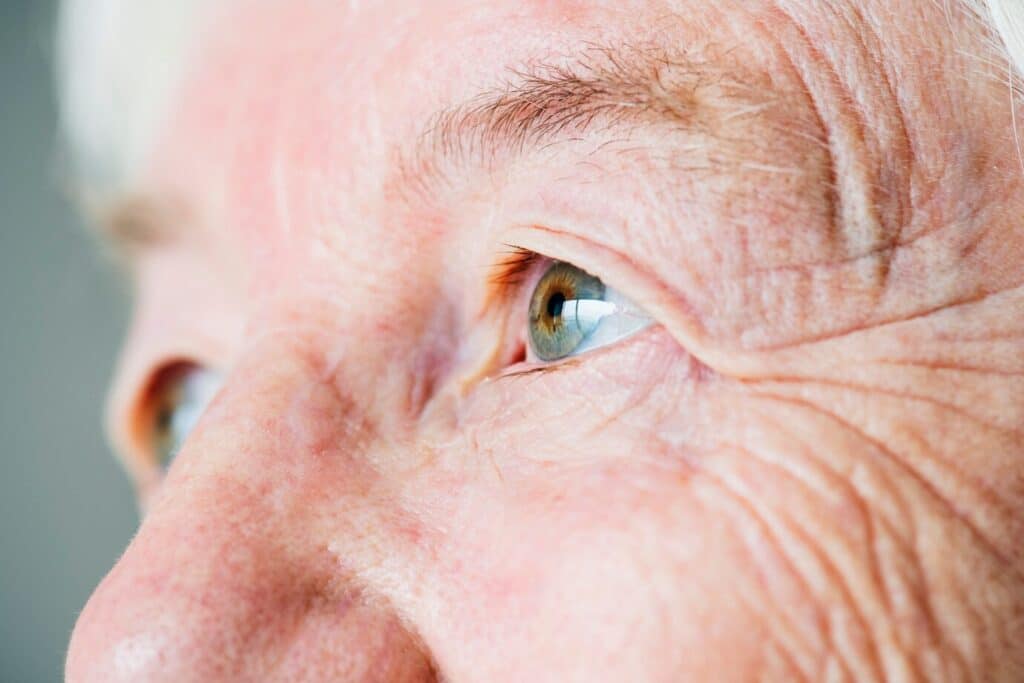As we age, it’s important to remember that systemic health problems like high blood pressure, heart disease, or diabetes can seriously damage your eyes as well. Always tell your ophthalmologist about your health conditions and what medications and nutritional supplements you take. Here are our senior eye health tips for your loved one.
Managing Diabetes for Healthy Eyes
High blood sugar levels can damage the blood vessels in your eyes, leading to vision problems. Managing your diabetes through a healthy diet, regular exercise, and medication (if prescribed) can help prevent eye damage.
Hypertension’s Impact on Eye Health
For people with hypertension, high blood pressure can cause damage to the blood vessels in the eyes, leading to vision problems. Uncontrolled hypertension can also increase the risk of age-related macular degeneration.
Managing hypertension through a healthy diet, regular exercise, and medication (if prescribed) can help prevent eye damage. Regular eye exams can also help detect potential eye problems early on, allowing for timely treatment.

Hypertension’s Impact on Eye Health
How Cardiovascular Disease Affects Vision
Diabetes and hypertension are not the only systemic health problems that can affect your eyes. Cardiovascular disease, which includes conditions like heart disease and stroke, can also impact your vision.
Eyes are susceptible to changes in blood flow and oxygenation, making them susceptible to damage from cardiovascular disease. Regular eye exams and managing cardiovascular disease through a healthy lifestyle and medication (if prescribed) can help prevent vision problems.
Note as a senior; it’s essential to prioritize your eye health by managing systemic health problems and scheduling regular eye exams. At Westmont of Encinitas, we care about your senior eye health tips and encourage you to contact us at 760-452-6037 for more information. Additionally, you can learn more about senior eye health tips and resources from the American Academy of Ophthalmology (American Academy of Ophthalmology).
What Level of Care Do You Need?
Discover the level of care you or your family member requires.
Low Vision Doesn’t Have to Mean Low Ability
One of the most significant concerns for seniors is the impact of low vision on daily life. However, with the right strategies and resources, adapting and maintaining independence is possible despite vision loss.
Adapting to Age-Related Macular Degeneration
Aging eyes are more susceptible to age-related macular degeneration (AMD), a leading cause of vision loss in seniors. While AMD can significantly impact daily life, there are ways to adapt. By using assistive devices, such as magnifying glasses or closed-circuit television systems, and making lifestyle changes, such as increasing lighting and reducing glare, you can confidently continue to perform daily tasks.
Coping with Cataracts: Strategies for Daily Life
Lifestyle adjustments can significantly improve daily life for those with cataracts. By implementing simple strategies, such as using bright lighting, reducing glare, and using assistive devices like magnifying glasses, you can continue to perform daily tasks with ease.
According to the American Academy of Ophthalmology, cataracts affect more than 24 million Americans aged 40 and older. By understanding the impact of cataracts on daily life and seeking professional guidance, you can develop effective coping strategies and maintain independence.
Maintaining Independence with Low Vision
With the right resources and support, maintaining independence is possible despite low vision. Working with a low-vision specialist can help you develop personalized strategies for daily tasks such as reading, cooking, and managing finances. Additionally, incorporating assistive technology, such as text-to-speech software or magnifying devices, can improve daily life.
Have you considered consulting with a low-vision specialist? They can help you develop a personalized plan to maintain independence and confidence despite vision loss. At Westmont of Encinitas, we’re committed to supporting seniors with low vision. Contact us at 760-452-6037 to learn more about our resources and services.
Remember, low vision doesn’t have to mean low ability. By adapting to age-related macular degeneration, coping with cataracts, and maintaining independence with low vision, you can live a fulfilling and independent life.

Maintaining Independence with Low Vision
Preventing Eye Injuries at Home Can Save Your Sight
It’s crucial to acknowledge that nearly half of all eye injuries occur in or around the home, often during improvement projects. The good news is that almost all eye injuries can be prevented by taking simple precautions.
As a senior, you’re more prone to eye injuries due to age-related changes in vision and balance, increasing your risk of falling at home. Taking proactive measures can significantly reduce the risk of eye injuries and protect your sight.
Fall Prevention Measures for Seniors
Injuries from falls are a common cause of eye injuries among seniors. To prevent falls, make sure to:
Secure rugs and shower/bath/tub mats to prevent slipping, remove small rugs that can be a tripping hazard, secure stair railings, cushion sharp corners and edges of furnishings and home fixtures, and increase lighting to improve visibility.
Safe Use of Chemicals and Cleaning Products
Measures should be taken to ensure the safe use of chemicals and cleaning products to avoid eye irritation or injury. Always:
Read and follow the instructions on product labels, wear protective eyewear when using harsh chemicals, and avoid mixing different cleaning products.
Cleaning products can be hazardous to your eyes, so it’s important to take precautions. When using chemicals or cleaning products, ensure the area is well-ventilated and avoid getting them in your eyes. If you get a chemical in your eye, flush it with water immediately and seek medical attention if the irritation persists.
Protecting Eyes from Sharp Objects and Debris
Safe handling of sharp objects and debris is crucial to preventing eye injuries. When working with sharp objects or power tools, always:
Wear protective eyewear, such as safety glasses or goggles, to shield your eyes from flying debris or particles.
With age, your reaction time and coordination may slow down, making it more challenging to avoid accidents. Protecting your eyes from sharp objects and debris can significantly reduce the risk of eye injuries and maintain your senior eye health.
Nourish your Eyes With Exercise
For seniors, exercise is not just about maintaining physical health, but also about preserving eye health. Regular physical activity has been shown to reduce the risk of age-related macular degeneration, cataracts, and other eye problems.
The Benefits of Regular Physical Activity for Eye Health
With regular exercise, you can improve blood flow and oxygenation to your eyes, reducing the risk of eye diseases. Exercise also helps maintain a healthy weight, reducing the risk of diabetes, a leading cause of vision loss in seniors.

Regular Physical Activity
Simple Eye Exercises for Seniors
Eyes need regular exercise to stay healthy, just like the rest of your body. Simple exercises like rolling your eyes, focusing on near and far objects, and massaging your eyes can help improve vision and reduce eye strain.
Exercise is vital for eye health, and simple exercises can be done anywhere, anytime. Try rolling your eyes in a circular motion, first clockwise and then counterclockwise. Then, focus on a near object, such as a book or a pen, and then shift your gaze to a far object, like a picture on the wall. Repeat this process several times a day to improve your vision and reduce eye fatigue.
How Yoga Can Improve Vision
Your eyes will thank you for practicing yoga. Yoga has been shown to improve vision, reduce eye strain, and even lower intraocular pressure, a risk factor for glaucoma.
Simple yoga poses, such as child’s pose, downward-facing dog, and shoulder stands, can help improve blood flow and oxygenation to the eyes. Yoga also reduces stress, which is a major contributor to eye problems. By incorporating yoga into your daily routine, you can improve your overall eye health and reduce the risk of age-related eye diseases.
Remember to consult with your ophthalmologist before starting any new exercise program, especially if you have any underlying health conditions. For more information on senior eye health tips, contact Westmont of Encinitas at 760-452-6037.
Sleep Well for Healthy Eyes
Getting adequate sleep is crucial for maintaining healthy eyes. As we age, our sleep patterns often change, and it’s imperative to prioritize sleep to protect our vision.
The Importance of Adequate Sleep for Eye Health
Healthy eyes rely on adequate sleep to function properly. During sleep, your eyes enjoy continuous lubrication, and irritants like dust, allergens, or smoke that may have accumulated during the day are cleared out. Research suggests that light-sensitive cells in the eye are important for regulating our wake-sleep cycles, which becomes even more critical as we age.

Adequate Sleep for Eye Health
Creating a Sleep-Conducive Environment
For a restful night’s sleep, create a sleep-conducive environment by ensuring your bedroom is dark, quiet, and at a comfortable temperature. Consider using blackout curtains, earplugs, or a white noise machine if necessary.
Plus, make sure your bedroom is free from electronic devices, including TVs, computers, and smartphones, as the blue light they emit can interfere with your sleep. Instead, opt for a relaxing bedtime routine, such as reading a book or listening to soothing music.
Managing Sleep Disorders for Better Vision
Environmental factors, such as a lack of natural light, can disrupt our sleep patterns and affect our eye health. If you experience insomnia or other sleep disorders, consult with your healthcare provider to develop a plan to manage your condition.
Healthy sleep habits are imperative for maintaining healthy eyes. By prioritizing sleep and creating a sleep-conducive environment, you can reduce the risk of eye problems and protect your vision. Keep in mind, you and your ophthalmologist are partners in caring for your vision. If you experience any changes in your vision or have concerns about your eye health, don’t hesitate to schedule an appointment.
Nutrition for Healthy Eyes
Once again, a healthy lifestyle plays a crucial role in maintaining your senior eye health. A well-balanced diet rich in crucial nutrients can significantly reduce the risk of age-related eye diseases. As you age, your eyes require more nutrients to function properly, and a deficiency in these nutrients can lead to vision problems.
The Role of Omega-3 Fatty Acids in Eye Health
On the list of crucial nutrients for healthy eyes are omega-3 fatty acids. These healthy fats, particularly EPA and DHA, have anti-inflammatory properties that help protect your eyes from damage caused by age-related macular degeneration (AMD). Foods rich in omega-3 fatty acids, such as fatty fish, nuts, and seeds, can help reduce the risk of AMD.
Antioxidants and Their Impact on Vision
Antioxidants, such as vitamins C and E, lutein, and zeaxanthin, play a vital role in protecting your eyes from oxidative stress and inflammation. These nutrients help neutralize free radicals that can damage your eyes and lead to age-related eye diseases.
Health experts recommend consuming antioxidant-rich foods, such as leafy greens, fruits, and nuts, to support your eye health. Additionally, consider taking supplements containing these antioxidants after consulting with your ophthalmologist.
A Balanced Diet for Senior Eye Health
Balanced nutrition is key to maintaining healthy eyes as you age. Focus on consuming a diet rich in whole foods, fruits, vegetables, whole grains, and lean proteins. Avoid processed and sugary foods that can lead to inflammation and oxidative stress.
Another important aspect of a balanced diet is staying hydrated. Drink plenty of water throughout the day to help your eyes function properly and reduce the risk of dry eye syndrome.
Recall, a healthy diet is just one aspect of maintaining your senior eye health. Regular exercise, proper sleep, and regular eye check-ups with your ophthalmologist at Westmont of Encinitas (760-452-6037) are also crucial for preserving your vision. By following these senior eye health tips, you can reduce the risk of age-related eye diseases and maintain healthy eyes for years to come.

A Balanced Diet for Senior Eye Health
Regular Eye Exams: A Crucial Aspect of Senior Eye Care
Your eyes are a vital part of your overall health, and as you age, it’s imperative to prioritize their care. Regular eye exams are crucial for seniors, as they can help detect potential issues early on, preventing vision loss and improving overall eye health. According to Sight Scotland, regular eye exams are one of the top five tips for eye health in older people.
Why Annual Eye Exams Are Essential for Seniors
With age, the risk of developing eye diseases such as cataracts, glaucoma, and age-related macular degeneration increases. Annual eye exams can help identify these conditions early, allowing for prompt treatment and potentially saving your vision.
What to Expect During a Comprehensive Eye Exam
Seniors can expect a comprehensive eye exam to include a series of tests to assess their visual acuity, refractive errors, and eye health. This may include a visual acuity test, refraction, and tonometry to measure eye pressure.
During the exam, your eye doctor will also examine the retina and optic nerve, looking for signs of age-related macular degeneration or other retinal diseases. Additionally, they may perform a dilated eye exam to get a closer look at the retina and detect any potential issues.
Staying Up-to-Date with the Latest Eye Care Technology
Care for your eyes requires staying current with the latest advancements in eye care technology. At Westmont of Encinitas, our experienced eye care professionals utilize cutting-edge technology to provide comprehensive eye exams and treatments tailored to your unique needs.
Exam technology has come a long way in recent years, allowing for more accurate diagnoses and effective treatments. By staying up-to-date with the latest advancements, our team can provide you with the best possible care for your eyes.
5 Essential Senior Eye Health Tips
As you age, your eyes become more susceptible to various health problems that can affect your vision and overall well-being. It’s crucial to prioritize your senior eye health to maintain your independence and quality of life. You’re not alone in this journey; according to 6 Must-Know Tips for Senior Eye Health, many seniors face similar challenges. At Westmont of Encinitas, we’re committed to providing you with the necessary guidance and support to protect your eyesight. In this article, we’ll explore five crucial senior eye health tips to help you navigate the changes that come with aging.
Find Where You Belong
Dive into the vibrant life our Westmont communities have to offer.
Summing up
With these considerations in mind, you can take proactive steps to protect your senior eye health. Recall, systemic health problems can affect your eyes, and low vision doesn’t have to mean low ability. Preventing eye injuries at home, nourishing your eyes with exercise, sleeping well, and being aware of your risk for certain eye diseases can all contribute to healthy vision as you age. For more information on senior eye health, visit the American Academy of Ophthalmology’s resource on Senior Vision: Over 60 Years of Age. By prioritizing your eye health, you can enjoy a clearer, healthier vision for years to come. At Westmont of Encinitas, we care about your senior eye health tips and encourage you to take control of your vision. Contact us at 760-452-6037 to learn more.








